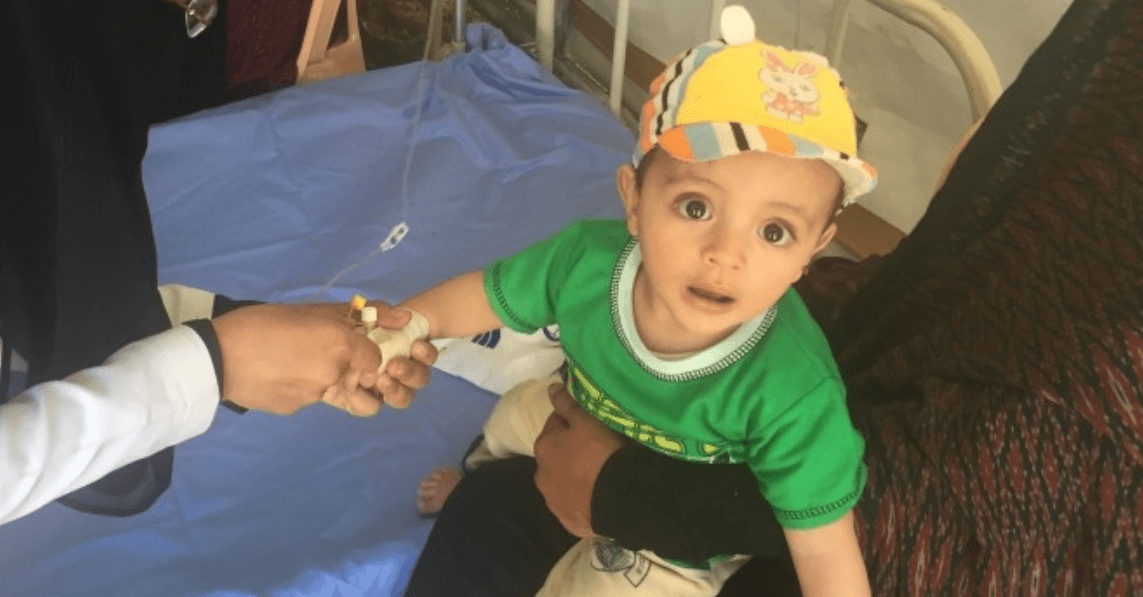Start Network’s Laura-Louise Fairley reports on the Start Fund response to cholera in Yemen, when the rapid release of funds allowed those suffering to receive help in just two days while major humanitarian donors were only just waking up to the emerging crisis.
The world is facing the largest humanitarian crisis since the end of the Second World War and at its broken heart is Yemen, a country ravaged by conflict as Saudi Arabia and Iran wage a proxy war in the Arab world’s poorest nation.
Two years of conflict have devastated the lives of ordinary people and left nearly 15 million without access to basic health care, while 17 million people are on the edge of famine, leaving the country ‘on the brink of catastrophic disaster’. In the past year alone, more than 10,000 children have died from preventable diseases and nearly 2 million are acutely malnourished.
In a manifestation of this dire humanitarian catastrophe, Yemen is now in the grip of a severe cholera epidemic on an unprecedented scale. A total of 484,733 suspected cholera cases and 1,961 associated deaths have been reported in Yemen since 27 April 2017; it is the worst outbreak of the disease in recorded history. Cholera - an acute diarrhoeal disease that can kill within hours – is an easily treatable disease, but rapid access to treatment is essential during a cholera outbreak.
Rapid response
By mid-May it was clear that aid was not sufficient to counter the spiralling number of cases and authorities announced a state of emergency. Resources from protection and nutrition programmes could not be shifted fast enough within the country and lives were needlessly slipping away. One of the contributing factors to the high levels of cholera in this outbreak was the failure to respond sufficiently and rapidly to the first outbreak in late 2016.
Almost immediately after the state of emergency was declared, Start Network members raised an alert to the Start Fund. Within 53 hours, nearly £300,000 was awarded to International Medical Corps, Relief International, and Save the Children to implement life-saving rapid response programmes.
Prevention and treatment
The Start Network members focussed on both prevention and treatment of cholera. Prevention efforts looked to long-term approaches, and included monitoring the quality of water through biological and chemical tests and distributing chlorine water tablets for the water systems.
Health and sanitation specialists also conducted health and hygiene education sessions, distributed family hygiene kits, and mobilised community health volunteers to identify suspected cholera cases and refer them to the nearest health facilities. For treatment of cases, cholera treatment centres and oral rehydration points were established and provided with essential medicine, medical, and non-medical supplies.
"Thanks to the Start Fund, Relief International was one of the fastest responders to cholera in Yemen, establishing oral rehydration points and diarrhoea treatment centres where there were previously none. The project likely saved the lives of hundreds of vulnerable people in remote areas that would otherwise have not had access to this emergency healthcare." Dr Tammam Al-Hitari, Project Manager for the Relief International cholera response project.
"Save the Children has scaled up its response and is sending more health experts to the worst hit areas. Thanks to the Start Fund, we rapidly distributed essential hygiene items such as buckets, and helped thousands of people to access clean water", explained Adam Kalopsidiotis, Humanitarian Response Officer for Yemen at Save the Children.
Filling the gap
The fund played a critical role in enabling NGOs to respond early and fast to a spike in this under the radar emergency. Chiara Montaruli of International Medical Corps stressed that "the Start Fund was essential in reaching the affected population in a timely manner, filling a gap in funding from the international community".
The international response to the cholera outbreak was simply not quick enough. Lives can be lost to cholera within a matter of hours and the outbreak escalated far too rapidly for the international community to react in time. Despite millions of dollars being released for the protracted humanitarian crisis in Yemen there are huge shortfalls and significant underfunding. A recent OCHA report estimated that less than one-third of the needed medical supplies are entering the country.
A broken system
While the epidemic in Yemen spirals out of control, the humanitarian response is not working. Despite there being no shortage of funding for arms deals, humanitarian appeals are falling short. To date, the 2017 Yemen Humanitarian Response Plan is only 24% funded, with the crucial Health and WaSH (Water, sanitation and hygiene) clusters funded at only 13% and 12% respectively. Even when funds are pledged, there are crippling embargos imposed on ports which has led to delays in importing essential relief items and medicine.
Time for change
At the Start Network we are leading for change in humanitarian aid. In the case of Yemen, localised coordination and decision making within the Network allowed for the rapid release of aid which reached those suffering from cholera within just two days. Humanitarian agencies were not delayed by lengthy, bureaucratic applications for funding and were granted high flexibility to adapt programming as the situation evolved.
While the three Start members mentioned above began implementing their response to the outbreak, major humanitarian donors were only just waking up to the emerging crisis. Thanks to this rapid response mechanism many lives were potentially saved – both today and in the future. But change is desperately needed on a much larger scale, from governments, donors, and humanitarians.
For the people of Yemen, time is running out, and change cannot come fast enough.

